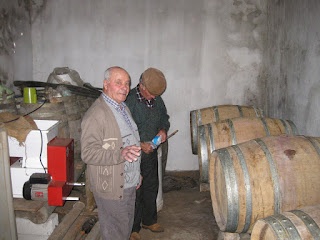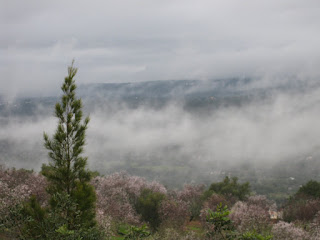 This week has drizzled, showered, poured and stormed its way towards the weekend. If the weather continues like this, which it gives every appearance of doing, the Algarve will lose its sunny reputation. The conversation in the cafes and with neighbours is all about the rain. It’s wet; wetter than we can remember it, wet and grey when we wake; grey and wet when we sleep.
This week has drizzled, showered, poured and stormed its way towards the weekend. If the weather continues like this, which it gives every appearance of doing, the Algarve will lose its sunny reputation. The conversation in the cafes and with neighbours is all about the rain. It’s wet; wetter than we can remember it, wet and grey when we wake; grey and wet when we sleep.  Espargal spends much of its time hiding in the mist. Down in the valley frustrated farmers cruise slowly past in their pick-ups, looking dolefully at the lakes occupying their lands. Wet or not, the dogs still insist on a walk each morning and evening. We’ve been taking them down in the car to the narrow tarred road that runs through the valley.
Espargal spends much of its time hiding in the mist. Down in the valley frustrated farmers cruise slowly past in their pick-ups, looking dolefully at the lakes occupying their lands. Wet or not, the dogs still insist on a walk each morning and evening. We’ve been taking them down in the car to the narrow tarred road that runs through the valley.  At least that way we can stay out of the dirt while they rush around, leaping across the ditches, splashing through the lakes and squishing through the mud. We take towels with us to dry them down before bringing them home. (Additional towels and blankets protect the seats and the rear of the car.)
At least that way we can stay out of the dirt while they rush around, leaping across the ditches, splashing through the lakes and squishing through the mud. We take towels with us to dry them down before bringing them home. (Additional towels and blankets protect the seats and the rear of the car.) A guest dog is spending the week with us. She is Herme; she belongs to Dutch neigh- bours who are away for a few days. The boys have often bumped into her on the road and regard her as one of the gang. Herme looks as though butter wouldn’t melt in her mouth, half dog, half angel.
A guest dog is spending the week with us. She is Herme; she belongs to Dutch neigh- bours who are away for a few days. The boys have often bumped into her on the road and regard her as one of the gang. Herme looks as though butter wouldn’t melt in her mouth, half dog, half angel.  But she has shown a hidden talent for dragging Jones into prickly wet bushes and for rousing cats in the night. She’s fitted in well enough, especially around the hearth, where it counts. There’s nothing like a fire in the wood-burning stove to settle the dogs down – us too, for that matter, especially in front of the TV at night.
But she has shown a hidden talent for dragging Jones into prickly wet bushes and for rousing cats in the night. She’s fitted in well enough, especially around the hearth, where it counts. There’s nothing like a fire in the wood-burning stove to settle the dogs down – us too, for that matter, especially in front of the TV at night. This (Friday) afternoon I have finally received the e-tickets from KLM that I booked and paid for 24 days ago – to visit Cathy and Rolf in Berlin in mid-March.
This (Friday) afternoon I have finally received the e-tickets from KLM that I booked and paid for 24 days ago – to visit Cathy and Rolf in Berlin in mid-March. Their arrival followed further frustrating hours of phoning KLM’s call centre and refaxing through (proof of payment) documents that I’d twice faxed through already.
 The last straw was to hear yesterday that the reser- vations had been cancelled because payment had not been received. In desperation I emailed the airline’s agents into whose account the fare had been paid. They immediately emailed me back to say that they were providing KLM with proof of payment, which they evidently did. What I can’t figure is why KLM didn’t get in touch with them 23 days ago, puzzlement that I’ve expressed in a detailed letter of my woes to the airline.
The last straw was to hear yesterday that the reser- vations had been cancelled because payment had not been received. In desperation I emailed the airline’s agents into whose account the fare had been paid. They immediately emailed me back to say that they were providing KLM with proof of payment, which they evidently did. What I can’t figure is why KLM didn’t get in touch with them 23 days ago, puzzlement that I’ve expressed in a detailed letter of my woes to the airline.With our flights settled at last, we’re waiting to hear whether looming strikes by BA staff may affect the flights of our house-sitters. They are due to arrive in Faro the day before our departure and we’re depending on them to tend the beasts in our absence.
 SLEEPING CATS
SLEEPING CATSAnother complication that required much telephoning to sort out concerned the travel insurance that we’ve been taking out each year with a UK insurance company before visiting family overseas. In the back of our minds is the disastrous experience of an acquaintance who inadvertently bankrupted himself by having a stroke while on a visit to the USA. Desirous of avoiding any such disaster, we have been careful to obtain medical cover as part of the annual travel policy.
 SHELTER FROM A SHOWER
SHELTER FROM A SHOWERThis year, the insurance company refused to provide me with medical cover. As my medical circumstances hadn’t changed, I thought that the refusal was based on my landing in the dreaded “65 and plus” category. Fortunately, a conversation with the insurers revealed that it had been based on a misunderstanding and they’ve issued the cover as usual.
 Before I leave the subject of complications, let me add that a French woman with two large dogs has just taken a two-month rental in a guest cottage just across a field from us. We dropped by the other day to say hello and suss her dogs out. They were impressive; not hostile but also not to be tangled with. We are taking every precaution to avoid the area when we go walking. The boys think they own the hillside but they could be in for a nasty surprise.
Before I leave the subject of complications, let me add that a French woman with two large dogs has just taken a two-month rental in a guest cottage just across a field from us. We dropped by the other day to say hello and suss her dogs out. They were impressive; not hostile but also not to be tangled with. We are taking every precaution to avoid the area when we go walking. The boys think they own the hillside but they could be in for a nasty surprise.Why doesn’t life keep itself simple? I wish I knew.
 COBBLER'S DEN
COBBLER'S DENThe simplest task of the week was to get the front of my long-suffering Ecco boots sewn up. To do this I nipped into the den occupied by the elderly cobbler who operates in a building beside the senior university. He sits amid his tools and a pile of footware in a scene that could come straight out of the 15^th century but declines to have his picture taken because the place isn’t tidy enough.
 I dropped the boot off with him before classes and picked it up again afterwards, paying the princely sum of 3 euros for his troubles. The only other cobbler in Loule has closed down a similar operation and when this old fellow goes, that will be the end of the trade – except for the kiosks now to be found in shopping centres.
I dropped the boot off with him before classes and picked it up again afterwards, paying the princely sum of 3 euros for his troubles. The only other cobbler in Loule has closed down a similar operation and when this old fellow goes, that will be the end of the trade – except for the kiosks now to be found in shopping centres.I have reached “E” in my book on word origins. What a treasure chest it’s proving! Did you know that the word “doll” is derived from Dorothy (like Hal from Harry and Tel from Terry), or the origins of “draconian” and “dunce” (from the Athenian, Draco, and the Scottish theologian, Duns Scotus).
 DUNS SCOTUS
DUNS SCOTUSJust as fascinating was to discover that don and doff came from “do on” and “do off”. “Do” originally meant put or place. Now who would have known that?
Saturday morning: Last night we attended a concert in Faro, a Brahms piano concerto followed by Beethoven’s 7^th – after supper at a restaurant adjoining the theatre. I don’t remember much about the first piece. Fortunately I don’t fall over when I dose.
 Even Jones confessed to shutting her eyes during the second movement.
Even Jones confessed to shutting her eyes during the second movement. The weather’s horrible and the dogs want to go walking. I’ve no enthusiasm for it. Jones says it's time to go, even if we don't feel like it. She took a dawn photo. See what you think!

































